
Are you increasingly worried about swelling in your eyelids, cheeks, or entire face in the morning? Perhaps you should seriously think about your health. If the problem disappears by lunchtime, you just need to get a good night's sleep, but if the swelling does not subside even in the evening and appears regularly, this may indicate problems with the cardiovascular system or other serious diseases.
A similar problem can periodically arise in every woman, even if she leads a healthy lifestyle, but it’s still worth understanding why your face swells in the morning in your case, how to deal with it and what to do to prevent this from happening again.
Causes of morning swelling

Many circumstances can lead to swelling in the morning, the reasons can be very different. For example, excessive accumulation of moisture in the body indicates a violation of water metabolism. The fact is that it is there that the subcutaneous tissue is looser, which means more moisture will accumulate in it.
Either a small area or the entire face can swell; the swelling can be subtle or pronounced.
Quite often, such swelling is just a consequence of an unhealthy lifestyle, a love of nightclubs, working until the morning, or drinking alcohol. One of the reasons may be drinking large amounts of water at night.
If your face is swollen in the morning, the reasons may also be as follows::
- the body's reaction after drinking alcohol the day before;
- pregnancy;
- premenstrual period;
- menopause;
- sudden change in diet;
- avitaminosis;
- regular dehydration;
- fasting (including strict diets or fasting).
Wrong lifestyle

As noted above, the cause may be excessive consumption of water or other liquids at night. This is especially pronounced in winter, since in summer most of the fluid comes out with sweat.
Lovers of salty foods should remember that salt retains fluid in the body (1 g of salt - 100 g of liquid), as a result, the face and eyelids may swell. Alcohol also leads to dehydration, and the body responds to this by retains water in the intercellular space.
Remember that your sleep should be complete and comfortable, since lack of sleep and an unsuccessfully chosen pillow also lead to swelling. Be less nervous and rest more, don’t use low-quality cosmetics and everything will be fine.
If you can say with a high degree of confidence what the swelling is due to, try to avoid such situations in the future. Otherwise, it’s worth getting examined, because this could also be a danger signal that your body sends to you.
Sign of the presence of diseases
A swollen face in the morning can be a symptom of various diseases.
Here are just a few of them:

Swelling of the upper eyelids may be the result of allergies to food, pollen, dust, animals or insects.- If swelling is localized around the eyes and appears regularly, you should consider checking your kidneys. Especially if “bags” often begin to appear under the eyes.
- The cause may also be heart failure due to impaired sodium ion metabolism. They are usually accompanied by shortness of breath and increased blood pressure.
- If swelling has formed in the nose area, this may be a sign of sinus inflammation or even chronic diseases of the upper respiratory tract.
- If the swelling is dense and uneven, this may be a consequence of hormonal disorders or neoplasms of the soft tissues of the face.
If your face and eyes are swollen in the morning, the reason may be minor, but still this is a reason to see a doctor and pay attention to your health.
Ways to solve the problem
There are a large number of ways to combat the problem of face swelling in the morning. What to do in each specific case can be understood by understanding the reasons for this phenomenon. First of all, it is worth finding out why water retention occurs in the body.
To do this, you need to remember whether this problem has appeared now or whether this happens regularly. If the day before you just ate a lot of salty foods or drank alcohol, nothing bad will happen; after 3-4 hours the unpleasant symptoms will go away.

The same applies to situations where you are used to drinking a lot of liquid at night. Try not to drink too much water, it will not do any good. A person should consume approximately 30 grams of liquid per day (soup, tea, and other foods count) per kilogram of weight. If you constantly want to drink, you should get tested for diabetes.
If swelling accompanies menstruation, just try to consume as little salt as possible during this time and check your kidney function just in case. If the problem turns out to be with the kidneys, the doctor will prescribe you a suitable diuretic, but you should not self-medicate.
In what other cases should you consult a doctor?:
- Quincke's edema due to an allergic reaction;
- problems with the liver or bladder (the swelling subsides only in the evening; when you press on it, a trace remains for a long time);
- high blood pressure and problems with the cardiovascular system (swelling also appears in the legs, shortness of breath often occurs);
- upper respiratory tract problems;
- malfunction of the thyroid gland (hoarse voice and enlarged larynx);
- Poor circulation (large swelling with a bluish tint).
Good ways to combat morning swelling can be acupressure of the eyelid area, an antihistamine if the cause is allergies, and a decongestant mask.
A cold compress made from herbal infusion (chamomile, mint and St. John's wort) can also help cope with the problem. Drink green tea with milk in the morning; it has a slight diuretic effect, which means it removes excess fluid from the body.
Quick self-help methods
If the swelling is not constant, but you need to get in shape quickly, one of the methods will help:
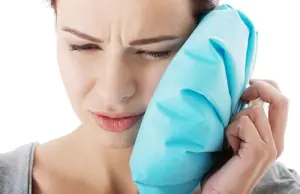
First, take a contrast shower.- Then make a cold compress for your face: hold a cloth soaked in cold water on it for at least ten minutes.
- If this doesn't help, run your face under a stream of cold water. You can use ice, the swelling will disappear in a few minutes.
- Swelling under the eyes can be lubricated with Lyoton, Troxevasin or Dolobene - this will help improve fluid circulation in this area and relieve swelling.
- Instead of ointments, you can use a tea compress: old tea bags can also be used, but it is better to brew loose leaf tea and soak cotton pads in it.
Prevention of edema
To avoid swelling in the morning, just follow simple rules. But this does not apply to edema associated with pathological changes in health - in this situation a doctor is needed.

Get the right pillow, a pillow that is too big will interfere with the flow of fluid from your upper body.- Eat right: less salty, spicy and do not overuse liquids, especially at night.
- Get plenty of rest and be sure to get enough sleep at night.
- Use quality cosmetics.
- Use decongestant masks (they are sold in almost any cosmetic store), you can also make them yourself.
If these recommendations do not help to cope with swelling, and it becomes regular, be sure to consult a doctor. Impaired circulation of fluid in the body can be a sign of quite serious diseases.
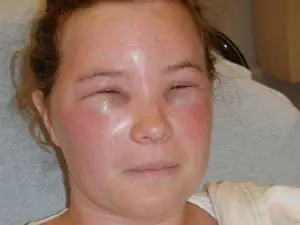
A swollen face in the morning does not make anyone happy. In most cases, the person himself knows the reason for such an unpleasant phenomenon, for example, a prolonged holiday the day before or copious tears after domestic troubles. But it also happens that there were no parties or stress, but there is an unsightly puffiness of the face, and it bothers you regularly. The main causes of swelling of the face and eyes are always fluid retention in the subcutaneous tissue. But a variety of factors can provoke stagnation. In any case, swelling on the face does not look good on anyone and indicates a disorder in the body, so it is important not just to remove or disguise them, but to eliminate the true cause.
Note: swelling of the upper eyelids and bags under the eyes are formed if the volume of retained fluid in the body exceeds three liters. This condition cannot pass without consequences for the whole organism, especially if it persists for a long period. That is why, if the face regularly swells, it is extremely imprudent on the part of the patient to turn away from this alarming signal and not consult a doctor.
What causes swelling on the face
If the eyes and face are swollen, the reasons can be both pathological and physiological. Pathological causes are diseases of the internal organs or organs of vision, which are accompanied by disturbances in the outflow of fluid and its retention in the body. Most often they are:
- Kidney dysfunction.
- Arterial hypertension.
- Liver failure.
- Diseases of the heart and blood vessels.
- Pathologies of the thyroid gland and the endocrine system as a whole.
- Metabolic disorders - vitamin deficiency or hypervitaminosis.
But sometimes the face can swell even in a healthy person, in this case they talk about physiological swelling under or above the eye and on the face. Why they may occur:
- A strict diet with severe dietary restrictions, fasting for various reasons.
- Chronic lack of sleep.
- Stress, tears, nervous tension.
- Eye fatigue due to excessive strain.
- Incorrectly selected decorative cosmetics or care products.
Some women experience severe swelling of the face before the onset of menstruation. In children, swelling is often accompanied by colds caused by viruses or bacterial infections. To determine the exact cause of swelling on the face, it is best to go to see a doctor or invite a specialist to your home. If for some reason this is not possible, you need to pay attention to other symptoms that accompany swelling and puffiness of the face and organs of vision.
Other symptoms and signs of facial swelling
By the accompanying symptoms, you can determine which diseases caused the edema. Let's look at the most common signs and phenomena that may indicate the development of which pathologies and disorders:
- Dense, painless swelling on the face and around the eyes, forming in the late afternoon, bluish skin, shortness of breath are possible signs of heart disease. In this case, you should contact a cardiologist.
- If your eyes are swollen after a night's sleep, the problem may be improper kidney function or chronic alcohol abuse. The swelling is soft, watery, mobile, and the skin on the face acquires a yellow tint. To remove such swelling, you will need to adjust your lifestyle and drinking regime, and in case of kidney failure, undergo appropriate treatment from a nephrologist.
- High blood pressure provokes the accumulation of fluid not only on the face, but also on the limbs. Swelling with high blood pressure can be relieved only with the help of special drugs that dilate blood vessels, accelerate blood circulation and have a diuretic effect. It is also recommended to limit fluid intake.
- With allergic edema, the following phenomena are observed: redness of the skin, itching, burning, rashes and peeling. Shortness of breath often develops, lacrimation, runny nose and cough appear. The reasons may be some medications and food products, cosmetics, chemical vapors, even poor-quality water, for example, with chlorine. In severe cases of allergies, the patient begins to choke, may lose consciousness and fall into a coma. The wisest thing to do would be to call a doctor as soon as possible if allergy symptoms are rapidly increasing.
- With vascular pathologies, in addition to swelling, a red capillary network is often noticeable in the eyes and on the skin of the face, bruises form under the eyes, and the head may become very dizzy and hurt.
- If the eyes are red, swollen, watery, purulent discharge appears, visual acuity is impaired, most likely we are talking about ophthalmological diseases caused by infection. An ophthalmologist will tell you what to do and how to treat swelling along with other unpleasant symptoms after examining you and determining the type of infection.
- Infectious diseases of the oral cavity and upper respiratory tract, among other pathologies, can cause swelling of the eyes and face. Caries, tonsillitis, pharyngitis, sinusitis are often accompanied by edema and swelling around the eyes, on the bridge of the nose, temples, and in the area of the cervical lymph nodes. Treatment in this case requires complex treatment.
How to deal with swelling
The choice of an effective decongestant depends on the cause of the swelling. Both pharmaceutical preparations and traditional medicine recipes are used, and various physiotherapy procedures will be a good addition. But you shouldn’t try all the suggested remedies on yourself at once. The desired effect is achieved only with consistent, coordinated actions. The basic rules of treatment are as follows:
- For pathologies of the kidneys, liver, and blood vessels, undergo the necessary examination and begin comprehensive treatment of the underlying disease. As the functions of the internal organs are restored, the swelling will also go away. Diet therapy and physical activity that stimulates the outflow of blood and lymph will be a good help.
- Diseases of the endocrine system require more complex and lengthy treatment. Restoring hormonal levels is not so easy, especially in older people. Various herbal remedies will help here, which can be used for a long time without significant side effects. In diabetes mellitus, following a diet is extremely important.
- Treatment of allergic edema, as mentioned above, is based primarily on identifying the irritant allergen. Any antihistamines alleviate the patient's condition only temporarily, but do not provide a lasting therapeutic effect. Therefore, a patient prone to allergic reactions should always have with him a sheet with a list of hazardous substances, and it is also necessary to make an appropriate entry in the medical record.
- Pain and swelling due to eye inflammation or upper respiratory tract infections are also eliminated through complex treatment. Antibacterial and anti-inflammatory drugs of systemic action and agents for local use are used: various solutions and liquids for washing, rinsing, compresses and lotions.
Pharmacies offer a wide range of different diuretics. Some of them have a rather aggressive effect on the body and have a long list of contraindications and side effects. Therefore, you can resort to medication to solve the problem only after examination by a doctor.
For severe swelling, your doctor may prescribe one of the following medications:
What traditional medicine advises
The simplest, most accessible and safe diuretic is fresh vegetable or fruit juices. Experienced people recommend combining a quarter glass of freshly squeezed juices of carrots, cucumbers, celery and lemon. Stir the resulting mixture, add 50 ml of warm water and drink on an empty stomach. If you do this procedure every day for three weeks, you can get rid of not only swelling on the face, but also cleanse the intestines and skin of waste and toxins, and lose up to 3 kg of excess weight.
The following recipes will also help in the fight against edema:
- Mint infusion. Chop fresh or dry mint. You will need two handfuls of fresh, two tablespoons of dried. Place the mint in a thermos and pour 500 ml of boiling water, close and leave for one hour. Drink the strained infusion warm in small sips throughout the day. This remedy is suitable for combating edema in children and pregnant women.
- Flax seeds. A tablespoon of seeds is poured into a bowl, poured with a liter of water, placed on the fire, brought to a boil and cooked for a quarter of an hour. Then cover and let it brew for an hour. The infusion is drained and taken warm in small portions throughout the day. The seeds can be wrapped in gauze and applied to the swelling for a quarter of an hour as a compress. The course of treatment lasts two weeks or until swelling is completely eliminated, if it has not gone away after 14 days.
- Bearberry. Two tablespoons of bearberry are poured into 500 ml of hot water, covered and left for half an hour. Then the mixture is stirred and filtered. The infusion is taken three times a day, a third of a glass, the course of treatment lasts 14–21 days.
Cosmetic and spa treatments against facial swelling
If you need to quickly and radically eliminate physiological or age-related swelling under the eyes and on the face, you can always contact cosmetology salons and spa salons. Today, a number of effective procedures are offered using various equipment and cosmetics to combat any defects in appearance. What can a cosmetologist do in the absence of contraindications and the client’s solvency:
- Darsonvalization. Cleansed skin is treated with high-frequency currents. As a result, lymphatic drainage is activated, congestion is eliminated, tissues are saturated with oxygen, and look healthy and toned.
- Myolifting. It helps if facial puffiness is caused by sagging muscle tissue after injury, surgery, or due to age-related changes. The skin and muscles are exposed to dosed current discharges, which tones the tissues and improves their nutrition.
- Mesotherapy. This method consists of subcutaneously administering special solutions that stimulate metabolic processes and saturate tissues with oxygen and microelements. Immediately after the procedure, swelling may increase. This is a natural reaction of tissues to injections. But a few days after complete recovery, the contour of the face and eyes tightens, swelling goes away, the skin becomes firm, elastic, and has a beautiful, even color.
All procedures have contraindications and should only be performed by a qualified, experienced technician. After treatments at the spa, you should definitely follow all the specialist’s recommendations in order to minimize the likelihood of side effects and get the expected result.
What else can you do
Some advise, as an emergency aid, to lubricate problem areas with ointment against varicose veins and even against hemorrhoids. Such products contain active components that stimulate blood circulation and eliminate congestion in tissues. Heparin ointment, Troxerutin, Troxevasin, Relief pro have proven to be the most effective. Apply the ointment in a thin layer to cleansed and dry skin, without rubbing or stretching it. If you do this 4-5 times a day, swelling, swelling, bruises under the eyes and on the face will disappear in 2-3 days. But it is not recommended to use such products constantly to combat puffiness, since they are intended to solve completely different problems.
If there are no inflamed skin rashes, abrasions or scratches on the skin, you can try to remove swelling with soda compresses. To do this, dissolve baking soda in warm water at the rate of half a teaspoon for every 200 ml of liquid. Cotton swabs or pieces of gauze are moistened in the resulting liquid and applied to problem areas of the face. Keep the compresses on the face for at least fifteen minutes, then be sure to rinse the face with clean cool water, wipe dry and apply a moisturizing or nourishing cream to the skin so that it does not dry out.
And the last, but also very important recommendation: do not forget to monitor your diet and lifestyle while treating edema. You should limit your salt intake, including in ready-made foods. You need to exclude:
- canned food and pickles;
- sharp, fatty cheeses and sausages;
- fried, pickled, peppered;
- chocolate and confectionery products with rich creams;
- carbonated drinks.
Fermented milk and dairy products, fresh fruits and vegetables will help in the fight against edema. It is also recommended not to consume anything at all two hours before bedtime, stop using mobile gadgets, tablets, laptops, computers an hour before bedtime, and turn off the TV. You should sleep on a raised pillow, you can use a special cushion. All these measures will help prevent fluid retention in the body, as well as swelling of the eyes and face.
Thus, people at any age often have to deal with swelling of the eyes and face. This is due to the negative impact of external factors, a large number of irritant allergens, poor diet, and chronic diseases. You can fight swelling with medications, physiotherapy or the services of a cosmetologist, as well as proven folk remedies. It is important that the patient understands that it will be necessary to eliminate not only the external symptoms, but also their cause. And for this you will certainly need the help of a doctor and a comprehensive examination.

Swelling on the face and under the eyes in the morning can be caused by a variety of reasons, both harmless (poor nutrition, physiology), and serve as a symptom of serious ailments.
The area around the eyes is particularly prone to swelling due to a densely branched vascular network, a small amount of collagen and elastin in the skin and the absence of subcutaneous fat cells.
The content of the article:
Provoking factors
The appearance of edema can be caused by diseases of internal organs, allergies, prolonged exposure to the sun, reduced immunity, pregnancy and errors in the diet.
Most often, swelling is a consequence of stress, fatigue and lack of sleep.
Improper functioning of internal organs
Kidneys
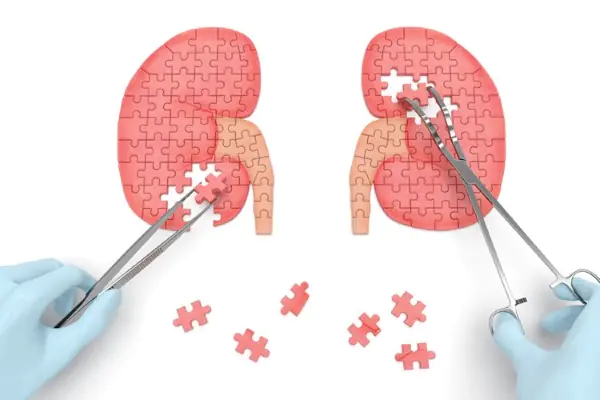
Swelling of the face and eyes is often caused by problems with the kidneys, which lead to kidney failure.
The following drugs are used to treat kidney diseases:
- Spasgan, No-shpa, Bespa - have an antispasmodic effect;
- Canephron, Phytolysin — uroantiseptic drugs;
- Cyclophosphamide, Azathioprine - act as cytostatics;
- Hypothiazide, Furosemide - have a diuretic effect.
Renal edema is the most difficult to get rid of, since it is very difficult to treat.
Therapeutic drugs are prescribed by the doctor after examination; self-medication of kidney diseases and swelling resulting from the disease is unacceptable.
Diabetes
Edema in diabetes is a complication of the disease, associated with pathologies of kidney function, and depends on the degree of heart failure.
They can be located locally: on the face, legs and throughout the body; their asymmetry indicates diabetic microangiopathy.
To help get rid of diabetic edema:
- low carbohydrate diet;
- physiotherapy;
- medications (Captopril - lowers blood pressure and prevents the development of kidney pathology, Valsartan, diuretics - Furosemide or Veroshpiron).
If there is a hormonal imbalance in the body, then you should take special dietary supplements that normalize hormonal levels.
Complexes of vitamins and minerals, developed specifically for diabetics, have a general strengthening and supportive effect on the body.
Sinusitis
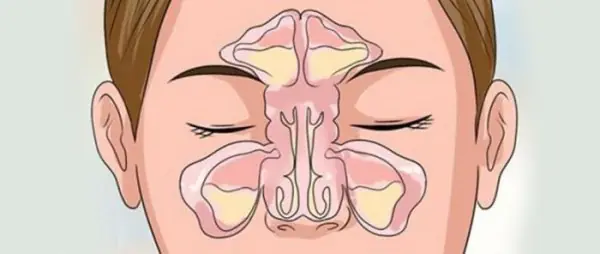
Sinus infections (sinusitis) can also cause puffiness in the face and eyes. An inflamed nasal septum leads to blockage of the nasal sinuses, as a result of which the secretion cannot pass to the nose from the sinuses and puts pressure on the forehead and around the eyes.
Infections of the paranasal sinuses can be caused by bacteria, viruses, fungi (with uncontrolled use of antibiotics) or as a reaction to an allergen.
Swelling on the face is localized exactly where pathogenic microorganisms develop most actively.
You can get rid of swelling by curing sinusitis, for which you use:
- medications for acute sinusitis Cefuroxime or Amoxicillin for 14 days, for chronic sinusitis - Augmetin for up to 30 days (the dose and duration of the course are prescribed by the doctor, self-medication is unacceptable), locally - Fusofungin, Bioparox;
- a sufficient amount of vitamin C (ascorbic acid), which strengthens the immune system;
- weakens and eliminates the symptoms of sinusitis by drinking plenty of warm liquid, for example, rosehip tincture with honey;
- inhalation (take 10 medium-sized bay leaves for 3 liters of boiling water, boil for 7 minutes, then breathe over the pan for 15 minutes).
Therapy is aimed at eliminating the root causes of the disease (bacteria, fungi, viruses or allergens), restoring normal secretion movement. And also to reduce the likelihood of complications and the disease becoming chronic.
Read here reviews about removing age spots on the face with laser.
Liver diseases
Diseases provoke the appearance of swelling on the face, under the eyes and on the hands. Such ailments are usually accompanied by symptoms:
- pain under the ribs on the right;
- bitterness in the mouth;
- heartburn, nausea, belching;
- yellowish tint to the whites of the eyes;
- light stool, dark urine.
Medicines used to treat liver diseases:
- Levolin, Hofitol, Essentiale Forte, Karsil - hepatoprotectors that protect organ cells from damage;
- Olimethin, Flamin, Gepafit - have a choleretic effect.
Cardiovascular diseases
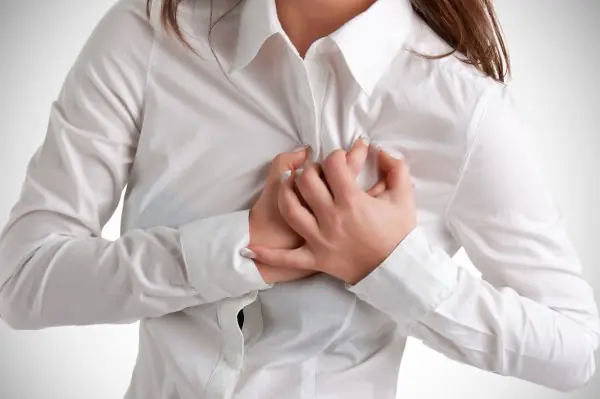
Heart disease is manifested by swelling in the eye area, swelling of the legs in the ankles and legs, especially if you had to stand for a long time.
When examining the peritoneum, an accumulation of fluid is detected. But edema is not the only symptom of heart disease; it is usually accompanied by:
- heartache;
- increased contraction frequency of the heart muscle;
- violation of the depth and frequency of breathing, in which there is a lack of air;
- weakness;
- A network of small vessels is observed on the skin of the face.
Vascular diseases manifest themselves as pale skin with a bluish tint and swelling under the eyes, and impaired outflow of venous blood can make them one-sided.
There is dizziness, sudden changes in blood pressure, and constantly cold extremities.
Drugs are prescribed depending on the type of pathology:
- antihypertensive drugs (Ramipril, Enalapril);
- diuretics (Hypothiazide, Bekvorin);
- cardiac glycosides, for example, Strophanthin K.
Diet
Salty and smoked dishes, spices, if consumed in excess, can disrupt the physiological process of fluid removal and contribute to its accumulation in the tissues of the body.
Products that cause edema:
- marinades;
- smoked dishes, canned food, fast food;
- sweet carbonated drinks;
- cream, eggs, various sauces, mayonnaise and ketchup;
- food rich in preservatives;
- sausage, frankfurters (they contain a lot of salt);
- sweets and confectionery products provoke a surge in insulin and contribute to excess body weight gain, honey and sugar provoke fluid retention in the body.
The presence of the following products in the diet will help remove excess fluid from the body:
- Watermelon, sweet peppers, viburnum, pumpkin, cucumbers, zucchini, strawberries have a weak diuretic effect.
- Apricots, citrus fruits, bananas, beets, melon and sweet potatoes are rich in potassium, which helps normalize the potassium-sodium balance in the body and eliminate swelling.
- Fiber improves digestion, cleanses the intestines and helps normalize the level of beneficial microflora in it. It is found in sufficient quantities in buckwheat, blueberries, oats, lingonberries, avocados, and bran. The dietary fiber intake for an adult is 30 g per day.
- Tomatoes, green lettuce, fresh white cabbage, asparagus, carrots, and ginger remove toxins and improve metabolism.
Drink plenty of fluids at night
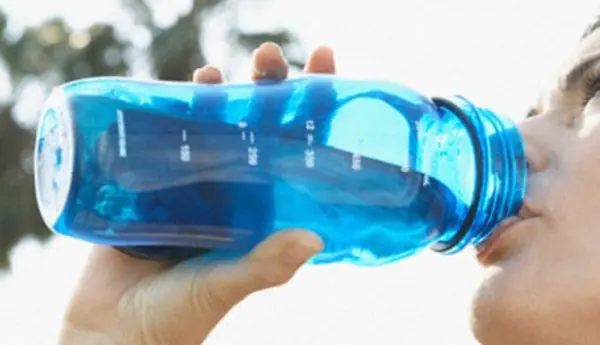
If you drink a lot of liquid before going to bed (tea, coffee, compote), then in the morning swelling will certainly appear on your face.
This is due to the fact that the kidneys are not able to remove large amounts of fluid from the body, and it is distributed throughout the tissues.
Sunburn
Direct rays of the sun promote the accumulation of water in the body. This is due to increased permeability of the vascular walls and impaired microcirculation of fluid in the lymphatic vessels and capillaries.
As a result, fluid enters the space between the cells and edema forms.
Following the rules will help to avoid the appearance of such swelling:
- You can sunbathe before 11 am and after 4 pm, and not in direct sunlight, but in the shade.
- Before going to the beach, the skin should be treated with sunscreen (the degree of protection of the cream should correspond to the skin type).
- After swimming, be sure to blot the water droplets on your skin with a towel, as they enhance the effect of the sun's rays (like small lenses), which leads to burns.
- In hot weather, water intake should be increased due to increased sweating.
- A hat is required on the beach.
- The consumption of alcoholic beverages is contraindicated.
Allergic reactions
Chlorinated water, low-quality cosmetics, plant pollen, animal hair, dust, and certain products can act as an allergen.
- tearfulness, stinging, itching of the eyes;
- photophobia and redness of the skin around the eyes;
- sneezing, runny nose, nasal congestion.
Swelling and accompanying allergy symptoms will disappear if you stop contacting the allergen. You can start taking antihistamines (Loratodine, Suprastin, Cetrin) and start using decongestants - Okumetil, Visina.
Pregnancy

The main hormone that coordinates pregnancy is progesterone. It helps slow down the excretion of sodium from the body, which contributes to the retention of fluid in the body and the appearance of swelling.
Initially the face swells, and later the body. The increasing volume of amniotic fluid causes a growing need for water.
Sometimes, in order to eliminate swelling, it is enough to reduce the amount of salt in the diet and the intensity of physical activity, reduce the time spent in the sun, and get proper rest.
Water retention in the body
Liquid can be retained in the body if its consumption is below normal. This usually happens if a person, struggling with swelling, limits the amount of water he drinks.
This is explained by the fact that the body is able to regulate the excretion of fluid with decay products dissolved in it. If not enough water is supplied, it begins to accumulate until the required amount is collected.
Constant use of diuretics also leads to the formation of edema.
In this article we will discuss whether it is possible to remove red moles on the face.
Reduced immunity
Reduced immunity is not able to cope with pathogens that constantly affect the body from the outside.
Other reasons
Water retention in the cells is provoked by the consumption of alcoholic beverages, which is why swelling under the eyes is detected in the morning.
Swelling is observed with tissue bruises on the face, when blood vessels are damaged and the outflow of fluid is impaired.
Also, swelling of the face can be caused by insect bites, inflammation, persistent erythema,
excess salt in foods.
How to remove
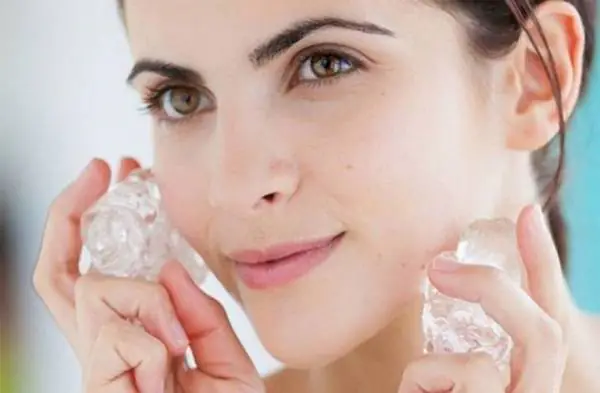
Ways to remove puffiness from the face and eyes in the morning:
- Drink a glass of water immediately after waking up with a few drops of lemon juice added to it. This will activate the work of internal organs and relieve swelling.
- You can do a special massage. Starting from the forehead, massage the skin with tapping movements (with strong pressure). Near the eyes and temples, tapping with fingertips should be light. After the massage, the swelling will quickly subside.
- Compress. Soak a small towel in very cold water and place it on your face. Make a compress for 10 minutes, periodically wetting the towel in cold water.
- Potato. Boil 3-4 potatoes depending on the size, drain the water, cool (the potatoes should be warm), mash and immediately apply to the swelling for 11-12 minutes. Rinse off with cold water. A mask is made once a day, the course is on average 10 procedures.
- Raw potatoes (2 medium-sized pieces) grate together with the peel on a fine grater, add 20 g of oatmeal. Apply a thick layer to your face and place gauze or cloth on top. You need to lie down with this mask for 1.5-2 hours.
- Bay leaf will help if swelling is caused by increased salt intake. Brew 5 leaves with 200 ml of boiling water, let it brew for 1 hour. Dip a towel or cloth into the solution and apply to your face. The effectiveness will increase if you drink 1 tbsp twice a day. spoon of this infusion.
- Rose hip decoction has a tonic and diuretic effect. Place 9-15 rose hips in an enamel bowl, add 750 ml of water (3 cups) and boil for 14 minutes.
Drink in small sips, you can add a little honey. The duration of the course is a maximum of 12 days, then you need to take a break for several weeks. In order to prevent the appearance of edema, irregular use of the decoction is recommended.
Rub your face with ice cubes in the morning for 5 minutes with an interval of 15 minutes between wipes. The number of wipes is 5 per procedure.
It’s great if these are frozen herbal decoctions (chamomile, thyme, linden, oak bark, plantain). Brew 2 tbsp boiling water. spoons of herbs, leave for 3 hours, pour into ice cube trays and freeze.
Sour cream. The fat content of the product is not particularly important; you can add chopped dill (in a blender) to the sour cream. Apply to face, after 16-18 minutes, rinse with water at room temperature. Cucumber. Apply finely chopped fresh cucumber to your face and wash off after 10 minutes.Prevention
A proper lifestyle will help prevent fluid accumulation in tissues. Constant use of diuretics is not the best way to get rid of swelling of the face and eyes, especially if there are no direct indications for taking such drugs.
General recommendations for the prevention of edema:
- Limit your consumption of fatty, salty, smoked foods, sweets and alcoholic beverages.
- Don't add enough salt to your dishes and try to get used to drinking tea without sugar.
- Increase your intake of fruits, vegetables and metabolism-boosting foods.
- Move more, play sports. Often, swelling is the result of stagnation in the body due to a sedentary lifestyle.
- Problems with the kidneys, liver, thyroid gland, heart and blood vessels manifest themselves in the appearance of edema. Visit the doctor in a timely manner and begin treatment.
- The norm of fluid intake per day for an adult is approximately 2 liters. Try to drink them.
Watch the video about the causes of swelling of the face and eyes, as well as methods for eliminating them.
Reviews
If you have had to get rid of facial swelling in the morning, you can share your experience of using the above remedies for swelling in the comments to the article.



